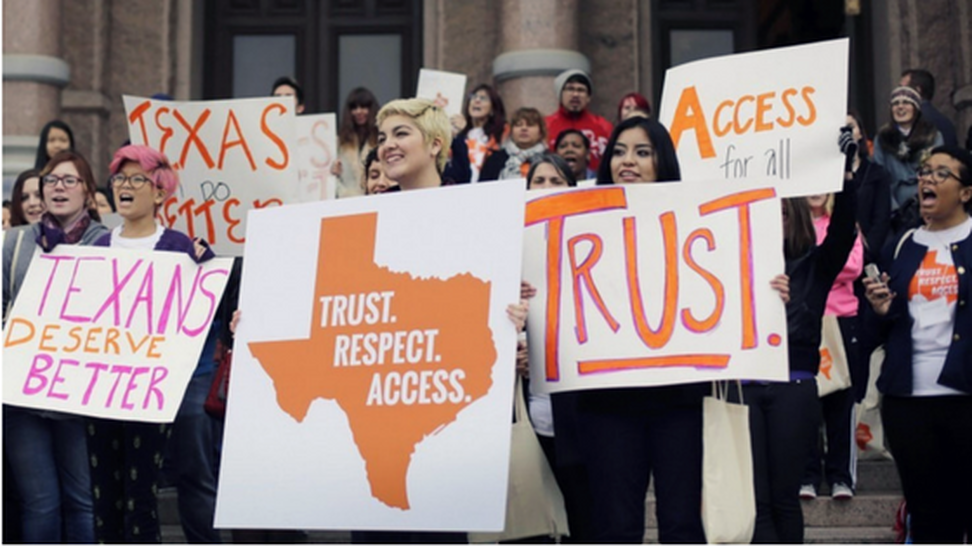by Olivia GeeWe often hear abortion referred to as a 'civil right.' The third and final presidential debate involved a fairly lengthy conversation about Roe v. Wade (1973), with Democratic nominee Hillary Clinton calling abortion "a woman’s constitutional right" (to the upset and disagreement of many Republicans on Twitter and elsewhere). In addition to this important distinction, Republican nominee Donald Trump also promised to “automatically” repeal the Roe decision if he is elected President.
For the sake of this discussion, let’s ignore the fact that the President never has the ridiculous power to render or override Supreme Court decisions. Let's also ignore the fact that she or he does not have the power to make laws (a function of Congress). Instead, we find it useful to revisit Roe v. Wade and remember why exactly abortion is considered a civil right and what parts of the U.S. Constitution protect it. Roe’s pregnancy In 1970, “Jane Roe” was an unmarried, pregnant resident of Dallas County, Texas. She wished to terminate her pregnancy but Texas law prohibited abortions except to save the woman’s life, and Roe could not afford to travel outside of Texas to undergo a safe and legal abortion. Her lawyers argued that the Texas abortion statutes abridged her civil right to privacy and that they were unconstitutionally vague. This was supported by a licensed physician’s claims that the statutes were too uncertain for physicians to understand; the statutes, he argued, were therefore a violation of the right to privacy in the doctor-patient relationship and the right of doctors to practice medicine. (He claimed this right was guaranteed in the spirit of the First, Fourth, Fifth, Ninth, and Fourteenth Amendments.) The Court’s decision The (all-male) Supreme Court held in favor of Jane Roe, ruling 7-2 that a person’s right to an abortion fell within the constitutional right to privacy, which was first recognized in the landmark birth control case Griswold v. Connecticut (1965) just eight years earlier. This right to privacy is specifically encompassed by the Due Process Clause of the Fourteenth Amendment, allowing individuals to be free from unwarranted and excessive government intrusion. Thus, personal liberty (with few exceptions) includes the right to make decisions regarding one’s own medical health. The Court ruled that, within the first trimester of pregnancy, a person has complete autonomy over the choice to terminate and that there is no legal State interest until the second and third trimesters. The Court continues to reject the “right to life” argument based on scientific arguments regarding pregnancy timelines and fetal viability. Planned Parenthood v. Casey, and now The Supreme Court qualified the constitutional right to abortion in Planned Parenthood of Southeastern Pennsylvania v. Casey (1992), ruling 5-4 that abortion laws and regulations could not impose an “undue burden” on people seeking abortions. This permitted states to enact some laws that could delay or hinder the right to abortion, but not impede it altogether. This year’s case Whole Woman’s Health v. Hellerstedt (2016) supported the decisions in Roe and Planned Parenthood by ruling that provisions (again, in Texas) requiring abortion clinics to be comparable to surgical facilities created a substantial obstacle for people seeking abortions. Justice Stephen Breyer explained that the Texas provisions did nothing to benefit the health of patients but did a great deal to prohibit the right to abortion. These types of provisions not only place an undue burden on the right to abortion but are also a direct attack on poor or rural women, who may not have access to many abortion clinics. Women are not incubators, and children born to families who have been forced to carry to term are not cared for in the ways they deserve. Anti-choice activists who call themselves “pro-life” should consider redirecting their resources toward making life more humane for children in orphanages and foster systems. Learn more about abortion law and the Supreme Court in Oyez’s Body Politic. If you would like to learn more about your rights or believe that you have been discriminated against please visit the Civil Rights Justice Center located at 2150 N. 107th Street in Seattle Washington or visit our website at civilrightsjusticecenter.com
4 Comments
Thanks for helping me understand that the Court states that the woman can have the right to make a decision in the early trimester. I can imagine how this information should be out there for anyone who might consider an early surgical abortion. It would give them the confidence to choose this path since we might have different reasons that we cannot share to everyone.
Reply
6/5/2022 11:41:28 pm
Hi, I’m Irina. I’m a healthcare provider from New York. I have been helping women with reproductive health concerns for the last 16 years.
Reply
Leave a Reply. |


